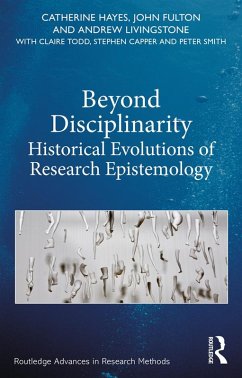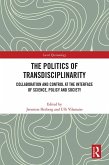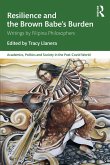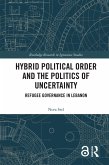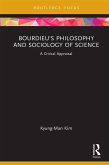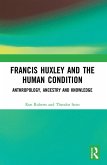Catherine Hayes, John Fulton, Andrew Livingstone, Claire Todd, Stephen Capper, Peter Smith
Beyond Disciplinarity (eBook, ePUB)
Historical Evolutions of Research Epistemology
40,95 €
40,95 €
inkl. MwSt.
Sofort per Download lieferbar

20 °P sammeln
40,95 €
Als Download kaufen

40,95 €
inkl. MwSt.
Sofort per Download lieferbar

20 °P sammeln
Jetzt verschenken
Alle Infos zum eBook verschenken
40,95 €
inkl. MwSt.
Sofort per Download lieferbar
Alle Infos zum eBook verschenken

20 °P sammeln
Catherine Hayes, John Fulton, Andrew Livingstone, Claire Todd, Stephen Capper, Peter Smith
Beyond Disciplinarity (eBook, ePUB)
Historical Evolutions of Research Epistemology
- Format: ePub
- Merkliste
- Auf die Merkliste
- Bewerten Bewerten
- Teilen
- Produkt teilen
- Produkterinnerung
- Produkterinnerung

Bitte loggen Sie sich zunächst in Ihr Kundenkonto ein oder registrieren Sie sich bei
bücher.de, um das eBook-Abo tolino select nutzen zu können.
Hier können Sie sich einloggen
Hier können Sie sich einloggen
Sie sind bereits eingeloggt. Klicken Sie auf 2. tolino select Abo, um fortzufahren.

Bitte loggen Sie sich zunächst in Ihr Kundenkonto ein oder registrieren Sie sich bei bücher.de, um das eBook-Abo tolino select nutzen zu können.
This book provides a means of comprehensively grounding and considering the epistemological and philosophical underpinnings of practice-based research epistemologies, introducing readers to the diverse array of methodological tools and concepts that necessary to underpin postgraduate research.
- Geräte: eReader
- mit Kopierschutz
- eBook Hilfe
Andere Kunden interessierten sich auch für
![The Politics of Transdisciplinarity (eBook, ePUB) The Politics of Transdisciplinarity (eBook, ePUB)]() The Politics of Transdisciplinarity (eBook, ePUB)54,95 €
The Politics of Transdisciplinarity (eBook, ePUB)54,95 €![Migration, New Nationalisms and Populism (eBook, ePUB) Migration, New Nationalisms and Populism (eBook, ePUB)]() Rada IvekovicMigration, New Nationalisms and Populism (eBook, ePUB)42,95 €
Rada IvekovicMigration, New Nationalisms and Populism (eBook, ePUB)42,95 €![Resilience and the Brown Babe's Burden (eBook, ePUB) Resilience and the Brown Babe's Burden (eBook, ePUB)]() Resilience and the Brown Babe's Burden (eBook, ePUB)39,95 €
Resilience and the Brown Babe's Burden (eBook, ePUB)39,95 €![Hybrid Political Order and the Politics of Uncertainty (eBook, ePUB) Hybrid Political Order and the Politics of Uncertainty (eBook, ePUB)]() Nora StelHybrid Political Order and the Politics of Uncertainty (eBook, ePUB)41,95 €
Nora StelHybrid Political Order and the Politics of Uncertainty (eBook, ePUB)41,95 €![Beyond Decolonial African Philosophy (eBook, ePUB) Beyond Decolonial African Philosophy (eBook, ePUB)]() Beyond Decolonial African Philosophy (eBook, ePUB)40,95 €
Beyond Decolonial African Philosophy (eBook, ePUB)40,95 €![Bourdieu's Philosophy and Sociology of Science (eBook, ePUB) Bourdieu's Philosophy and Sociology of Science (eBook, ePUB)]() Kyung-Man KimBourdieu's Philosophy and Sociology of Science (eBook, ePUB)40,95 €
Kyung-Man KimBourdieu's Philosophy and Sociology of Science (eBook, ePUB)40,95 €![Francis Huxley and the Human Condition (eBook, ePUB) Francis Huxley and the Human Condition (eBook, ePUB)]() Ron RobertsFrancis Huxley and the Human Condition (eBook, ePUB)43,95 €
Ron RobertsFrancis Huxley and the Human Condition (eBook, ePUB)43,95 €-
-
-
This book provides a means of comprehensively grounding and considering the epistemological and philosophical underpinnings of practice-based research epistemologies, introducing readers to the diverse array of methodological tools and concepts that necessary to underpin postgraduate research.
Hinweis: Dieser Artikel kann nur an eine deutsche Lieferadresse ausgeliefert werden.
Dieser Download kann aus rechtlichen Gründen nur mit Rechnungsadresse in A, B, BG, CY, CZ, D, DK, EW, E, FIN, F, GR, HR, H, IRL, I, LT, L, LR, M, NL, PL, P, R, S, SLO, SK ausgeliefert werden.
Hinweis: Dieser Artikel kann nur an eine deutsche Lieferadresse ausgeliefert werden.
Produktdetails
- Produktdetails
- Verlag: Taylor & Francis eBooks
- Seitenzahl: 116
- Erscheinungstermin: 22. Dezember 2020
- Englisch
- ISBN-13: 9781351609869
- Artikelnr.: 60473401
- Verlag: Taylor & Francis eBooks
- Seitenzahl: 116
- Erscheinungstermin: 22. Dezember 2020
- Englisch
- ISBN-13: 9781351609869
- Artikelnr.: 60473401
- Herstellerkennzeichnung Die Herstellerinformationen sind derzeit nicht verfügbar.
Catherine Hayes is Professor of Health Professions Pedagogy and Scholarship in the Faculty of Applied Sciences at the University of Sunderland, UK. She is also a National Teaching Fellow, Principal Fellow of the Higher Education Academy and Visiting Professor in Higher Education at the Universities of Cumbria and Liverpool Hope. Catherine is Secretary of the International Federation of National Teaching Fellows and works with the Ministry of Defence's Medical Defence Academy in framing military epistemology within a modernised education and training curriculum for tripartite services provision.
John Fulton is Director of Postgraduate Research and Associate Professor of Research- Based Practice at the University of Sunderland and co- editor of Studying Postgraduate Healthcare: A Pre- Reader , The Professional Doctorate and Mentorship in Healthcare .
Andrew Livingstone is Professor of Ceramics at the National Glass Centre, University of Sunderland, where he leads CARCuos (Ceramic Arts Research Centre) and is supervisor to PhD researchers. Andrew has authored and contributed to numerous books including The Ceramics Reader. As an artist and researcher, his exhibitions include the Smithsonian Institute and the Garth Clark Gallery, New York. His work is held in many private and public collections internationally, including Yingge Ceramics Museum, Taiwan, and the Garth Clark and Mark Del Vecchio Permanent Collection at the Museum of Fine Arts, Houston. He is a Senior Fellow of the Higher Education Academy and a member of the International Academy of Ceramics.
Claire Todd is an artist who works in sculpture, performance and installation, exhibiting works locally and internationally, including public sculpture in the Netherlands and Belgium. She studied Sculpture at Northumbria University and MA Scenography at St Martin's, London. Subsequent to that, she attended the postgraduate programme in sculpture at the Rijksakademie, Amsterdam. In 2003- 2004, Claire was recipient of the Helen Chadwick Fellowship to the British School at Rome and Oxford University and, in 2008, she received an NEA award to Corpus Christi University, Texas. Alongside this, Claire is a successful and much respected AHRC PhD graduate in the Department of Ceramics and Glass at the University of Sunderland.
Stephen Capper is a professional doctorate student in the Faculty of Health Sciences and Wellbeing at the University of Sunderland. A podiatrist and academic by professional background, Stephen's work has explored the notion of epistemology as applied to clinical sciences, specifi cally biomechanics. His groundbreaking work is among the fi rst to ever challenge the basis of scientific knowledge in podiatric medicine in relation to the claim of evidence- based praxis across this clinical discipline.
Peter Smith is Emeritus Professor of Computing. He joined the University of Sunderland as an undergraduate student in 1975 and received his doctorate in 1981. Since then, he has held several teaching, research and management positions at the university, including Dean and Chair of the University Research Degrees Committee. He has published over 250 papers, and has supervised and examined over 100 doctoral candidates at universities in the UK, Europe and Hong Kong. Peter is a Fellow of the British Computer Society and Principal Fellow of the Higher Education Academy. He has published extensively on a range of subjects including computing, management and doctoral studies, particularly in relation to professional doctorates.
John Fulton is Director of Postgraduate Research and Associate Professor of Research- Based Practice at the University of Sunderland and co- editor of Studying Postgraduate Healthcare: A Pre- Reader , The Professional Doctorate and Mentorship in Healthcare .
Andrew Livingstone is Professor of Ceramics at the National Glass Centre, University of Sunderland, where he leads CARCuos (Ceramic Arts Research Centre) and is supervisor to PhD researchers. Andrew has authored and contributed to numerous books including The Ceramics Reader. As an artist and researcher, his exhibitions include the Smithsonian Institute and the Garth Clark Gallery, New York. His work is held in many private and public collections internationally, including Yingge Ceramics Museum, Taiwan, and the Garth Clark and Mark Del Vecchio Permanent Collection at the Museum of Fine Arts, Houston. He is a Senior Fellow of the Higher Education Academy and a member of the International Academy of Ceramics.
Claire Todd is an artist who works in sculpture, performance and installation, exhibiting works locally and internationally, including public sculpture in the Netherlands and Belgium. She studied Sculpture at Northumbria University and MA Scenography at St Martin's, London. Subsequent to that, she attended the postgraduate programme in sculpture at the Rijksakademie, Amsterdam. In 2003- 2004, Claire was recipient of the Helen Chadwick Fellowship to the British School at Rome and Oxford University and, in 2008, she received an NEA award to Corpus Christi University, Texas. Alongside this, Claire is a successful and much respected AHRC PhD graduate in the Department of Ceramics and Glass at the University of Sunderland.
Stephen Capper is a professional doctorate student in the Faculty of Health Sciences and Wellbeing at the University of Sunderland. A podiatrist and academic by professional background, Stephen's work has explored the notion of epistemology as applied to clinical sciences, specifi cally biomechanics. His groundbreaking work is among the fi rst to ever challenge the basis of scientific knowledge in podiatric medicine in relation to the claim of evidence- based praxis across this clinical discipline.
Peter Smith is Emeritus Professor of Computing. He joined the University of Sunderland as an undergraduate student in 1975 and received his doctorate in 1981. Since then, he has held several teaching, research and management positions at the university, including Dean and Chair of the University Research Degrees Committee. He has published over 250 papers, and has supervised and examined over 100 doctoral candidates at universities in the UK, Europe and Hong Kong. Peter is a Fellow of the British Computer Society and Principal Fellow of the Higher Education Academy. He has published extensively on a range of subjects including computing, management and doctoral studies, particularly in relation to professional doctorates.
Introduction 1. Defining and Framing Epistemology 2. Reality, Insight and
Interpretation with Mathematics 3. Illustrating the Transcendence of
Disciplinarity 4. Positionality, Knowledge and Truth: So Where Lies
Reality? 5. The History and Context of Research in Art and Science 6.
Perspectives in Faith, Art and Science Conclusion Recommendations for
Further Reading
Interpretation with Mathematics 3. Illustrating the Transcendence of
Disciplinarity 4. Positionality, Knowledge and Truth: So Where Lies
Reality? 5. The History and Context of Research in Art and Science 6.
Perspectives in Faith, Art and Science Conclusion Recommendations for
Further Reading
Introduction 1. Defining and Framing Epistemology 2. Reality, Insight and
Interpretation with Mathematics 3. Illustrating the Transcendence of
Disciplinarity 4. Positionality, Knowledge and Truth: So Where Lies
Reality? 5. The History and Context of Research in Art and Science 6.
Perspectives in Faith, Art and Science Conclusion Recommendations for
Further Reading
Interpretation with Mathematics 3. Illustrating the Transcendence of
Disciplinarity 4. Positionality, Knowledge and Truth: So Where Lies
Reality? 5. The History and Context of Research in Art and Science 6.
Perspectives in Faith, Art and Science Conclusion Recommendations for
Further Reading
